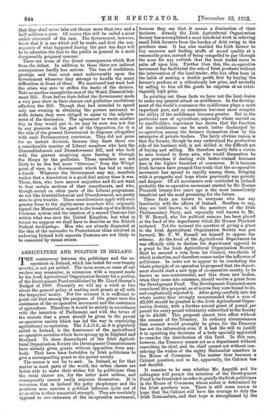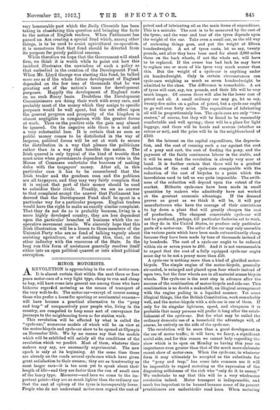AGRIC171211IRE AND POLITICS IN IRELAND. T HE controversy between the politicians
and the co- operators in Ireland, which has lasted for over twenty months, is not yet settled. The issue arose, as some of our readers may remember, in connexion with a request made by the Irish Agricultural Organization Society for a portion of the Development Fund established by Mr. Lloyd George's Budget of 1909. Presently we will say a word or two about the general policy of making such grants at all with the taxpayers' money. For the moment it is sufficient to point out that among the purposes of this grant were the assistance of the co-operative movement and the assistance of agriculture. Therefore it would be strictly in accordance with the intention of Parliament and with the terms of the statute that a grant should be given to the parent co-operative society which has led the way in organizing agricultural co-operation. The I.A.O.S., as it is popularly called in Ireland, is the forerunner of the agricultural co-operative societies which have sprung up in England and Scotland. To these descendants of the Irish Agricul- tural Organization Society the Development Commissioners have already given grants without opposition from any- body. They have been forbidden by Irish politicians to give a corresponding grant to the parent society. The reason is not far to seek. In Ireland, as for that matter in most parts of the world, the urban classes are better able to make their wishes felt by politicians than the rural classes are, for the latter meet seldom, and consequently cannot easily organize themselves. It is notorious that in Ireland the petty shopkeeper and the gombeen man exercise a political influence quite out of proportion to their numerical strength. They are resolutely opposed to any extension of the co-operative movement, because they see that it means a diminution of their business. Already the Irish Agricultural Organization Society has accomplished a most beneficial work in relieving small Irish farmers from the burden of debt owing to the gombeen man. It has also enabled the Irish farmer to buy manures and feeding stuffs of sound quality at a reasonable price, instead of being compelled to pay through the nose for any rubbish that the local trader cares to palm off upon him. Further than this, the co-operative movement has facilitated the sale of Irish products without the intervention of the local trader, who has often been in the habit of making a double profit, first by buying the farmer's produce at a ridiculously low price, and secondly by selling to him all the goods he requires at an extra- vagantly high price.
In pointing out these facts we have not the least desire to make any general attack on middlemen. In the develop- ment of the world's commerce the middleman plays a, most important part, and as commerce becomes more complex the utility of the middleman becomes greater. But in the particular case of agriculture, especially where carried on by smallholders, experience has shown that the function of the middleman can be much better discharged by co-operation among the farmers themselves than by the enterprise of private traders. The fairly obvious reason is that the farmer, though he may understand the productive side of his business well, is not skilled in the difficult art of buying and selling. He therefore easily falls a victim to men trained in those arts, who would themselves be quite powerless if dealing with better-trained business men in the higher branches of commerce. It is because Irish farmers have grasped this truth that the co-operative movement has spread so rapidly among them, bringing with it prosperity and hope where previously was poverty and despair. Of all movements ever instituted in Ireland probably the co-operative movement started by Sir Horace Plunkett twenty-five years ago is the most immediately beneficial and the most promising for the future.
These facts are known to everyone who has any familiarity with the affairs of Ireland. Needless to say, they are well known to all the members of the Irish Parliamentary Party, and especially well known to Mr. T. W. Russell, who for political reasons has been placed at the head of the department which Sir Horace Plunkett, initiated. Yet the moment the question of giving a grant to the Irish Agricultural Organization Society was put forward, Mr. T. W. Russell set himself to oppose the scheme. As the head of the Agricultural Department he was officially able to declare his department opposed to a grant to the Irish Agricultural Organization Society. Next he secured a vote from his Council, two-thirds of which is elective, and therefore comes under the influence of politicians. In order not to appear to be combating the whole principle of co-operation he proposed that the depart- ment should start a new type of co-operative society, to be known as non-controversial, and that these new bodies, when they came into existence, should receive a grant from the Development Fund. The Development Commissioners considered this proposal, as of course they were bound to do, and emphatically rejected it. After going carefully into the whole matter they strongly recommended that a sum of £2,000 should be granted to the Irish Agricultural Organ- ization Society, with a further annual grant of pound per pound for every pound voluntarily subscribed to the Society up to X4,000. This proposal cannot take effect without the consent of the Treasury. In ordinary circumstances that consent would promptly be given, for the Treasury has not the information even if it had the will to justify it in upsetting the decisions of a body specially appointed to consider the distribution of this fund. In this case, however, the Treasury cannot act as a department without consulting its chief, and its chief cannot act without con- sidering the wishes of the eighty Nationalist members in the House of Commons. The matter thus becomes a Cabinet question, and so far, apparently, the Cabinet has not decided.
It remains to be seen whether Mr. Asquith and his colleagues will permit the intention of the Development Fund to be frustrated in order to gratify the Irish politicians in the House of Commons, whose action is determined by the Irish gombeen man. There is still some reason to hope that the Cabinet will have the courage to defy the Irish Nationalists, and that hope is strengthened by the very honourable part which the Daily Chronicle has been taking in elucidating this question and bringing the facts to the notice of English readers. When Parliament has passed an. Act creating a special fund which, among other things, is to be used to assist agricultural co-operation, it is monstrous that that fund should be diverted from its purpose for purely political reasons. While therefore we hope that the Government will stand firm, we think it is worth while to point out how this incident illustrates the unwisdom of such a policy as that embodied in the creation of the Development Fund. When Mr. Lloyd George was starting this fund, he talked more suo as if the whole future development of England depended on the few tens of thousands that he was granting out of the nation's taxes for development purposes. Happily the development of England rests on no such flimsy basis. Doubtless the Development Commissioners are doing their work with every care, and probably most of the money which they assign to specific purposes would be well spent, but the net effect upon the general progress and prosperity of the kingdom is almost negligible in comparison with the greater forces at work. Thus on the positive side the gain may almost be ignored. On the negative side there is a real and a very substantial loss. It is certain that as soon as public money comes to be distributed in the way of largesse, political forces will be set at work to secure the distribution in a way that pleases the politicians rather than in a way that benefits the nation. The Irish quarrel is only typical of the kind of trouble that must arise when governments dependent upon votes in the House of Commons undertake the business of making doles with the taxpayers' money. After all, in this particular case it has to be remembered that the Irish trader and the gombeen man and the publican are all taxpayers, and they may very fairly complain that it is unjust that part of their money should be used to subsidize their rivals. Frankly, we see no answer to that complaint except the answer that Parliament has decreed that the Development Fund shall be spent in a particular way for a particular purpose. English traders would have the right to make an exactly similar complaint. That they do not do so is probably because, living in a more highly developed country, they are less dependent upon the particular branches of business which the co- operative movement assails. We sincerely hope that this Irish illustration will be a lesson to those members of the Unionist Party who are so fond of talking vaguely about assisting agriculture, or of assisting this, that, or the other industry with the resources of the State. In the long run this form of assistance generally resolves itself either into an open political quarrel or into silent political corruption.















































 Previous page
Previous page